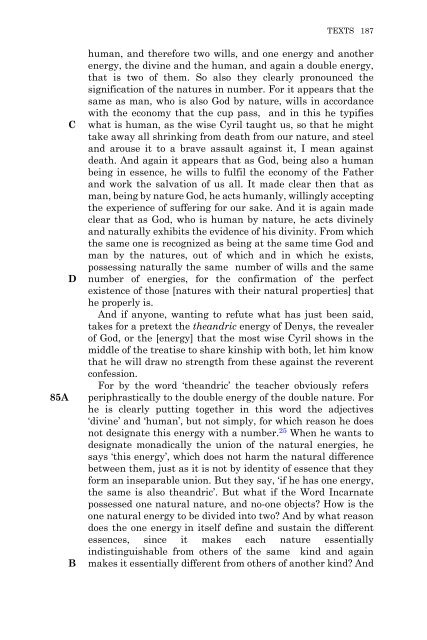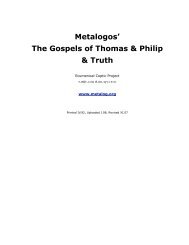Andrew Louth - Syriac Christian Church
Andrew Louth - Syriac Christian Church
Andrew Louth - Syriac Christian Church
Create successful ePaper yourself
Turn your PDF publications into a flip-book with our unique Google optimized e-Paper software.
85A<br />
C<br />
D<br />
B<br />
TEXTS 187<br />
human, and therefore two wills, and one energy and another<br />
energy, the divine and the human, and again a double energy,<br />
that is two of them. So also they clearly pronounced the<br />
signification of the natures in number. For it appears that the<br />
same as man, who is also God by nature, wills in accordance<br />
with the economy that the cup pass, and in this he typifies<br />
what is human, as the wise Cyril taught us, so that he might<br />
take away all shrinking from death from our nature, and steel<br />
and arouse it to a brave assault against it, I mean against<br />
death. And again it appears that as God, being also a human<br />
being in essence, he wills to fulfil the economy of the Father<br />
and work the salvation of us all. It made clear then that as<br />
man, being by nature God, he acts humanly, willingly accepting<br />
the experience of suffering for our sake. And it is again made<br />
clear that as God, who is human by nature, he acts divinely<br />
and naturally exhibits the evidence of his divinity. From which<br />
the same one is recognized as being at the same time God and<br />
man by the natures, out of which and in which he exists,<br />
possessing naturally the same number of wills and the same<br />
number of energies, for the confirmation of the perfect<br />
existence of those [natures with their natural properties] that<br />
he properly is.<br />
And if anyone, wanting to refute what has just been said,<br />
takes for a pretext the theandric energy of Denys, the revealer<br />
of God, or the [energy] that the most wise Cyril shows in the<br />
middle of the treatise to share kinship with both, let him know<br />
that he will draw no strength from these against the reverent<br />
confession.<br />
For by the word ‘theandric’ the teacher obviously refers<br />
periphrastically to the double energy of the double nature. For<br />
he is clearly putting together in this word the adjectives<br />
‘divine’ and ‘human’, but not simply, for which reason he does<br />
not designate this energy with a number. 25 When he wants to<br />
designate monadically the union of the natural energies, he<br />
says ‘this energy’, which does not harm the natural difference<br />
between them, just as it is not by identity of essence that they<br />
form an inseparable union. But they say, ‘if he has one energy,<br />
the same is also theandric’. But what if the Word Incarnate<br />
possessed one natural nature, and no-one objects? How is the<br />
one natural energy to be divided into two? And by what reason<br />
does the one energy in itself define and sustain the different<br />
essences, since it makes each nature essentially<br />
indistinguishable from others of the same kind and again<br />
makes it essentially different from others of another kind? And




